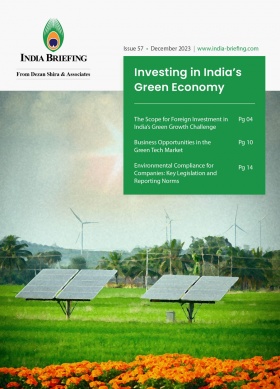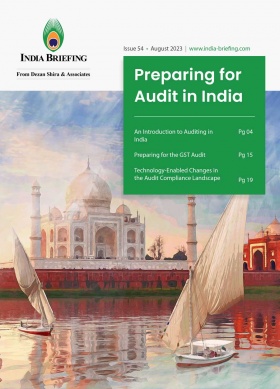India’s Tax Authority Issues Notification for Non-Resident Investors in Financial Products via IFSC Units
The Ministry of Finance notification delineates the criteria for the recognition of investment in a financial product by non-residents, particularly when the income is deposited in the non-resident’s account with the Offshore Banking Unit of the IFSC, as specified in section 80LA of the Income-tax Act, 1961.
India’s Ministry of Finance, via the Central Board of Direct Taxes, has issued a crucial advisory (Notification S.O. 66(E) dated January 4, 2024) under clause (4G) of section 10 of the Income Tax Act, 1961. This notification specifically focuses on non-residents engaging in investment activities through a contract with a capital market intermediary, particularly a unit of an International Financial Services Centre (IFSC). Capital market intermediaries include merchant bankers, lead merchant bankers or lead managers, registrars and share transfer agents (RTA), underwriters, debenture trustees, bankers to an issue, portfolio managers, as well as stockbrokers and sub-brokers.
India’s IFSC is located at the GIFT City in the state of Gujarat.
Frequently Asked Questions
- Which jurisdictions are relevant for capital market activities?
The GIFT IFSC recognizes the following jurisdictions as applicable for capital market activities:
- Indian jurisdiction: Governed by the SEBI Act 1992, the Securities Contracts (Regulation) Act, 1956 (42 of 1956), the Depositories Act, 1996 (22 of 1996), and provisions of the Companies Act, 2013 administered by SEBI.
- Foreign jurisdiction: Refers to any country other than India, whose securities market regulator is a signatory to the International Organization of Securities Commission’s Multilateral MoU (IOSCO’s MMOU) or has a bilateral MoU with SEBI and is not blacklisted by the Financial Action Task Force.
- What are the client categories eligible for financial services from intermediaries within the IFSC?
Capital market intermediaries within the IFSC can offer financial services to the following client categories:
- Individuals not residing in India;
- Non-resident Indians; and
- Financial institutions resident in India, eligible under FEMA to invest funds offshore, up to the extent permitted for outward investment.
- What are India’s tax incentives for capital market participants?
- Tax holiday: Tax holiday for 10 consecutive years within a block of 15 years for income derived from business activities conducted in the IFSC.
- MAT/AMT: Reduced rate of 9 percent for Minimum Alternate Tax (MAT) and Alternate Minimum Tax (AMT). Companies in the IFSC opting for the new tax regime are exempt from MAT.
- Capital gains tax: No tax to be paid on capital gains from specified securities listed on IFSC exchanges, whether by a non-resident or a Category III AIF located in the IFSC.
- GST on services: Nil Goods and Services Tax (GST) on services received by units in the IFSC and on services provided to IFSC/SEZ units or offshore clients.
- STT, CTT, Stamp Duty: Exemption from Securities Transaction Tax (STT), Commodity Transaction Tax (CTT), and Stamp Duty for transactions conducted on IFSC exchanges.
- Tax on interest: Pay no tax on interest paid by IFSC units to non-residents. Additionally, benefit from a 4 percent tax rate on interest paid to non-residents on long-term bonds and rupee-denominated bonds listed on IFSC exchanges.
For more details, see official FAQs here.
Key points
The CBDT notification empowers non-residents to participate in investment activities through recognized IFSC Units. Notably, the income generated must be received in the non-resident’s account with the Offshore Banking Unit of the respective IFSC, aligning with section 80LA [Deductions in respect of certain incomes of Offshore Banking Units and International Financial Services Centre] and its associated tax implications.
The notification establishes a structured avenue for non-residents to invest in financial products in India through recognized IFSC Units. The Offshore Banking Unit of the IFSC plays a crucial role in facilitating and managing the income derived from these investments. The notification unfolds new possibilities for non-resident investors, providing clarity on the regulatory framework and tax considerations.
- Capital market intermediary: The definition aligns with the International Financial Services Centres Authority (Capital Market Intermediaries) Regulations, 2021.
- Financial product: As per sub-clause (d) of sub-section (1) of section 3 of the International Financial Services Centres Authority Act, 2019.
- IFSC: In accordance with clause (q) of section 2 of the Special Economic Zones Act, 2005.
- Unit: Adopting the definition from clause (zc) of section 2 of the Special Economic Zones Act, 2005.
See Department of Revenue notification here.
Summary
Notification No. 04/2024 under clause (4G) of section 10 of the Income Tax Act, 1961, signifies a progressive step toward facilitating non-resident investments. By streamlining the process through recognized IFSC Units and aligning with section 80LA, the government aims to attract foreign investment while ensuring clarity on tax implications. This move is anticipated to stimulate offshore banking activities and enhance the role of IFSCs in financial markets. Non-resident investors are advised to thoroughly assess the opportunities and compliance requirements presented by this notification for informed decision-making.
About Us
India Briefing is produced by Dezan Shira & Associates. The firm assists foreign investors throughout Asia from offices across the world, including in Delhi and Mumbai. Readers may write to india@dezshira.com for more support on doing business in India.
We also maintain offices or have alliance partners assisting foreign investors in Indonesia, Singapore, Vietnam, Philippines, Malaysia, Thailand, Italy, Germany, and the United States, in addition to practices in Bangladesh and Russia.
- Previous Article EPFO Extends Deadline for Employers in India to Upload Wage Details for Higher Pensions by May 31, 2024
- Next Article Investment Spotlight on Western India: Gujarat vs Maharashtra








